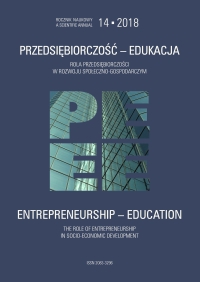Selected Models of Diffusion of Educational Innovations in the Regions
DOI:
https://doi.org/10.24917/20833296.14.31Keywords:
diffusion of innovation, educational innovation, educational system, entrepreneurship, local activity, principle of subsidiarity, subsidiarityAbstract
The purpose of this article is to present two models of disseminating educational innovations for development and shaping entrepreneurial competences in regions and support for the decision-making process regarding the selection of the diffusion model. The first one is called institutional, since it uses existing institutional structures of educational sector and introduces the system of cascade trainings, augmenting the range of innovations through competent trainers (top-down model). The second model of disseminating innovations is called grassroots (social, subsidiarity based; bottom-up model), as it is driven by local activity existing in regions and realised in accordance with the subsidiarity principle. The concept of subsidiarity assumes that the supply of innovation solutions is the response for the need of active local agents in regions, as well as the supplementation and methodical support of their educational and social activity. Both models were tested (observations, case studies) by Malopolska Institute of Culture in Krakow (Poland) in cooperation with partners during the implementation of domestic educational projects with the use of economic games inspired by history. The projects were realised with financial support of the Polish History Museum (2010, 2015) and the National Bank of Poland (2012-2013) and embraced the bottom-up as well as the top-down model of innovation diffusion.References
Chłopska Szkoła Biznesu. Rekomendacje (2017, 20 października). http://csb.mik.krakow.pl/rekomendacje/
Czapska, E. (2012). O zasadzie pomocniczości. Realia. Dwumiesięcznik społeczno-polityczny, 1(27). Pozyskano z: http://realia.com.pl/dzial_1/artykul_35.html
Innowacja i transfer technologii. Słownik pojęć. (2005). Warszawa: Polska Agencja Rozwoju Przedsiębiorczości.
Dolińska, J. (2010). Innowacje w gospodarce opartej na wiedzy. Warszawa: PWE.
Millon-Delsol, Ch. (1995). Zasada pomocniczości. Kraków: Znak.
Ostrowski, D. (2011). Model realizacji procedury strategicznej w placówce oświatowej. W: J. Czekaj, B. Mikuła, R. Oczkowska, J. Teczke (red.). Nauka i gospodarka w dobie destabilizacji. Kraków: UEK, 111–118.
Ośrodek Rozwoju Edukacji. (2017, 20 października). O Ośrodku, https://www.ore.edu.pl/o-nas/struktura-ore
Pietrasiński, Z. (1970). Ogólne i psychologiczne zagadnienia innowacji. Warszawa: PWN.
Podręcznik Oslo. Zasady gromadzenia i interpretacji danych dotyczących innowacji. Wydanie trzecie. (2008). Warszawa: OECD i Eurostat
Kicińska, M., Sarlej, A., Wacięga, S. (2013). Projekt Edukacja ekonomiczna z wykorzystaniem gry symulacyjnej „Chłopska Szkoła Biznesu”. Sprawozdanie merytoryczne. Kraków: Małopolski Instytut Kultury. Pozyskano z: http://mik.krakow.pl/wp-content/uploads/CSBNBP_sprawozdanie_ raport_V2013.pdf
Pietrasiński, Z. (1970). Ogólne i psychologiczne zagadnienia innowacji. Warszawa: PWN.
Pomykalski, A. (2001). Zarządzanie innowacjami. Warszawa: PWN.
Przyborowska, B. (2003). Struktury innowacyjne w edukacji. Teoria. Praktyka. Rozwój. Toruń: Wydawnictwo UMK
Rusin, D., Wacięga, S. (2014). Edukacja ekonomiczna w oparciu o historię. Przypadek Andrychowa (2007–2014). Kwartalnik Edukacyjny, 4(79). Pozyskano z: http://mik.krakow.pl/wp-content/uploads/ kwartalnik_edukacyjny_CSB.pdf
Suchanek, A. (1983). Innowacje oświatowe. Kalisz: WODN.
Przyborowska B. (2003) za: Suchanek (1983: 17).
Wacięga, S. (2015). Practical use of knowledge about history for entrepreneurial learning. The sketch of the method. In: M. Makowiec, T. Kusio (red.), Management of entrepreneurship in a knowledge based economy. The issue of knowledge and intellectual capital management. Kraków: Uniwersytet Ekonomiczny.
Wittbrodt, E. (2007). Contemporary Educational Challenge. In: E. Walkiewicz (red.). Lifelong Learning in the Context of Development of Civil Society. Warszawa–Gdańsk.
Weresa, M.A. (2014). Polityka innowacyjna. Warszawa: PWN.
Wyka, A. (2004). Co się dzieje z zasadą pomocniczości w Polsce?. ALTER. Pozyskano z: http://www.swietoradosci.most.org.pl/alter/wyka_co-sie-dzieje-z-zasada-pomocniczosci.htm
Zdun, M. (2016). Innowacje. Perspektywa społeczno-kulturowa. Lublin: Wydawnictwo KUL.
Downloads
Published
How to Cite
Issue
Section
License
Articles are published under the terms of the Creative Commons License (CC BY-ND 4.0; Attribution– NoDerivs).

